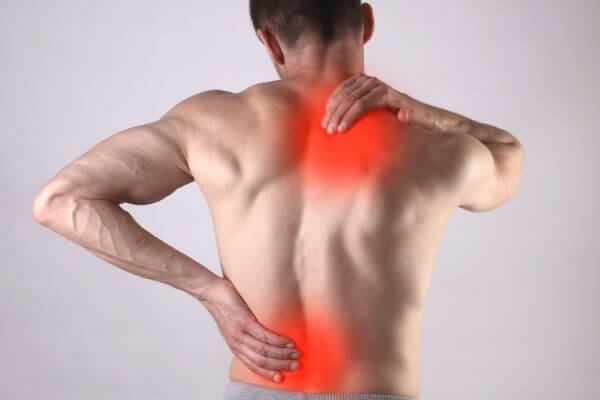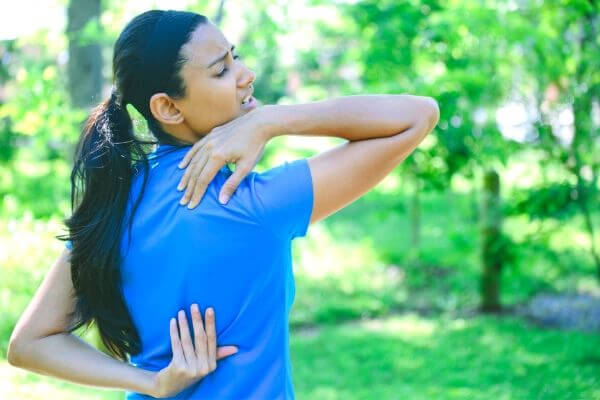Can't imagine life without your giant bag?
We know.
Carrying a big bag gives you options.
If you leave the house with just your handbag and decide to go shopping, you have to put your purchases somewhere, going to class, and need a lot of stuff that just won’t fit into a smaller bag?
Your big bag has ample space to tote all the books, tablets or laptops, pencils and other essentials you need.
Your big bag allows you to carry along a cardigan or scarf in case the weather changes on you.
And of course, if you are getting on a plane, your big bag functions as a "personal item" into which you can throw in the extra stuff that doesn’t fit into your luggage.
But once that bag is filled, you may find that you are too - filled with regret, that is the danger of heavy bags.
Muscle Pain

Toting heavy backpacks will inevitably leave you with muscle pain.
No matter how sturdy your bag is, no matter how padded and wide the straps.
If the bag is heavy enough and you carry it for long enough time, you may still find yourself suffering from muscle spasms and pain.
Your neck and shoulders are already prone to stress.
The last thing they need is to carry heavy bags. You are not a pack mule.
According to the American Chiropractic Association, you should never carry a bag that exceeds 10 percent of your body weight.
And that's only if the weight is balanced on both shoulders.
If you're carrying a heavy bag on one side only, it should only weigh 5 percent of your body weight.
The effects of carrying a heavy bag on one shoulder will obviously be worse for that side of your body than if you distributed the weight across both shoulders.
Consider this a hard-and-fast rule:
These days, a small handbag can weigh as much as a newborn baby.
Schoolbags (which would usually be carried on both shoulders) were once heavy with school books.
Children would leave whichever books they didn’t need at school so they could avoid carrying heavy objects.
Now, they are heavy with laptops that never leave a person's sight, and Laptops are always in the bag with an average weight of 3,5kg.
Other modern objects found in bags are phones, cameras, and headphones - all adding their own weight to the person carrying them.
A study done by Dr. Deepak Sharan of Bangalore-based RECOUP Neuromusculoskeletal Rehabilitation Centre demonstrated that back and posture problems are increasing in students who carry heavy backpacks.
Students would finish the day with pressure marks on their neck and shoulder as a result of using the straps of the backpack.
Other ailments included stooping postures and pain and stiffness in the neck. That's no way for kids to grow up.
The Trapezius
The trapezius is an important muscle that is responsible for moving, rotating, and stabilizing the shoulder.
When you carry a bag on one shoulder only, the asymmetric load puts undue stress on the trapezius muscle.
As this muscle is getting worked out, like all muscles, it will grow larger.

Other muscles are forced to compensate, and the heavy bag user can develop muscle spasms, or worse, misalignment of the spine.
Helping Friends

It’s so handy to have a big bag, and everyone else knows it.
It’s one thing to carry your own belongings. It’s another to carry everyone else’s.
When you have a big bag, you may frequently hear the question, “Do you mind putting this in your bag?”
You want to say no - past experience has shown that you should - but of course, you say yes.
And behold your bag is filled to the brim.
On the verge of breaking, and adds extra weight to your back and shoulders.
Most people don’t even realize what they are asking or the strain that is being put on your body.
Just say NO to avoid back pain and future posture problems.
Does Wearing a Backpack Make You Shorter?
The sad truth is, yes, carrying a heavy backpack for prolonged periods of time can actually make you shorter.
A heavy backpack has the potential to compress your spine over time, which makes you shorter.
Check out our post on the subject for more information, but this should be reason enough to avoid heavy backpacks.

Breaking the Fabric

And, while this is of a smaller concern than the very real health issues you can face by carrying a bag that is too heavy, loading up your bag is not good for its longevity, either.
Whether we're talking about a simple leather tote or a stylish backpack, if you routinely stuff it full of heavy objects, your bag will wear out much more quickly.
The seams will start to loosen, or a strap will break off. You try to unload the weight, but it is too late.
The damage has been done, and your bag has to be fixed or replaced.
How Can We Manage the Weight?
Lighten your load. Unfortunately, there is just no substitute for putting less weight in your bag.
This reduces the stress to the shoulder and lower back, and ultimately, back and shoulder pain.
Go through your bag and ask yourself, do I really need each item? Be brutal, understanding that every item you remove from your bag is one less weight you need to carry on your back.

Check the weight of your bag before going out. If it is more than 10% of your body weight, then get rid of what you don’t really need.
Carrying bags with wider straps protects the delicate nerves that pass from the neck to the shoulders.
Distribute the weight
Quit carrying over shoulder bags on one side. Get yourself one of these backpacks that are good for your back. Distributing the weight evenly will help reduce the chances of back pain.
Exercise
Strengthen your core to reduce stress on your lower back. Stretch regularly to keep your muscles loose and ward off spasms before they happen.
Do exercises every day so that you give you back, neck, and shoulders some relief.
Switch sides
If you absolutely must carry a bag over your shoulder, remember to switch sides every 10 minutes so that you distribute the strain evenly.
Finally, ask someone to carry the bag for you for a bit - especially if they have their own things.
Hopefully, this post has given you enough reasons to avoid weighing yourself down with a heavy bag. and some ideas on how to manage your load so that you can avoid health problems in the future.
By following our steps to manage your bag's weight, you can preserve both its lifespan and your own health.
And if you need a new backpack or bag, look no further than the wide variety we curate for you in the Leafy Souls shop.

